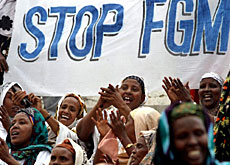Unicef sounds alarm over genital mutilation

A survey among Swiss health experts and social workers shows that almost a third of them have treated a woman with genital mutilation.
Unicef Switzerland is calling for medical and legal measures to stop the practice, as Elsbeth Müller of the United Nations children agency told swissinfo.
The appeal coincides with an international day of zero tolerance against female genital mutilation on February 6.
Every year about two million girls, mainly in Africa, are the victims of female cutting. It is believed that more than 130 million women and girls worldwide have suffered from some form of this practice.
Medical personnel in Europe, including Switzerland, increasingly find themselves treating circumcised women, as a result of the growing number of immigrants from Africa.
Unicef Switzerland, which carried out a survey last year, claims 7,000 women and girls now living in the country have suffered genital cutting.
swissinfo: What did the study find?
Elsbeth Müller: We noticed a growing number of gynaecologists and midwives who have been asked for advice about where female circumcision can be performed in Switzerland.
We were also surprised to learn how many of the respondents said they knew about girls who had undergone the practice or who were likely to be subjected to it.
swissinfo: People from which countries and age groups are victims of female genital mutilation?
E.M.: They are mainly women from Somalia, Ethiopia and Eritrea. Switzerland has fairly big communities from these countries. Most of the victims are between 19 and 34.
swissinfo: What does genital mutilation mean for the women affected?
E.M.: Genital cutting is painful. It is an attack on the physical and mental integrity of a woman or a girl.
But genital mutilation also means that these women suffer health problems for the rest of their lives, including infections of the urinary tract, cysts and abscesses as well as menstrual problems.
Added to this comes a diminished libido as a result of the total or partial removal of the external female genitalia. Often there are also complications during childbirth.
swissinfo: How does the situation in Switzerland compare with other countries in Europe?
E.M.: That’s difficult to say. Our colleagues in neighbouring Germany are conducting a similar study to find out.
But we can say that female genital mutilation has become more of an issue over the past five years. It affects all countries in Europe because more and more women have been immigrating.
swissinfo: What is Unicef doing to combat female genital mutilation?
E.M.: Unicef is committed to fighting for the eradication of the practice and to ensure that it is banned worldwide. We want to raise awareness of the consequences of female circumcision. A lot more needs to be done to inform the public about this, even in Switzerland.
Alternative options are needed to compensate people who previously carried out genital mutilation and have now given up the practice. Unicef is also calling for a clarification of the legal situation for people who are accomplices in cases of female genital cutting.
swissinfo: What needs to be done in Switzerland from a medical and legal point of view?
E.M.: Medical staff have be briefed about cultural backgrounds and the human-rights situation; guidelines have to be set concerning the legal situation.
We have to address the following questions: what is legal and how can we help to prevent more cases of genital cutting?
The legal situation in Switzerland is clear: it is illegal to carry out female genital mutilation on girls.
swissinfo: Can a family which takes a girl to Somalia, where circumcision is allowed, be held accountable under Swiss law?
E.M.: At the moment they cannot be prosecuted as accomplices. But of course we are taking a close look at this issue.
swissinfo: In many cases female genital mutilation is carried out for religious reasons. How does it affect the right to religious freedom?
E.M.: Female genital mutilation is not really linked to a specific religion. The argument of religious freedom is mainly used by fanatics.
But in reality the practice is an old tradition, dating back centuries. Supporters argue there are social and health reasons.
swissinfo: What role do human rights play?
E.M.: Female genital mutilation is a breach of human rights and the rights of the child. It is a harmful cultural tradition, which can lead to the death of the victim, and cannot be justified.
With the exception of Somalia and the United States, all countries have signed up to the UN Convention on the Rights of the Child. It is up to every individual state to ensure that girls living on their territory are protected.
swissinfo-interview
1,799 gynaecologists, paediatricians, midwives and social workers took part in the survey by Unicef Switzerland.
518 of them said they had treated or advised women who had undergone female genital cutting.
203 of respondents said they heard of cases of genital mutilation of girls in Switzerland.
2 midwives and 3 doctors said they had been approached to carry out such surgery.
Female circumcision or genital mutilation is mainly practiced in Africa, but it has spread to Europe through immigration.
Female genital cutting is considered by medical experts as amputation. The procedure involves the removal of the clitoris and the labia and often the stitching of the vaginal opening.
Many ethnic groups say female genital mutilation is part of their culture and tradition. But it is disputed whether there is a link between the practice and religion.
There has been no known case of female circumcision carried out in Switzerland to date.

In compliance with the JTI standards
More: SWI swissinfo.ch certified by the Journalism Trust Initiative










You can find an overview of ongoing debates with our journalists here . Please join us!
If you want to start a conversation about a topic raised in this article or want to report factual errors, email us at english@swissinfo.ch.